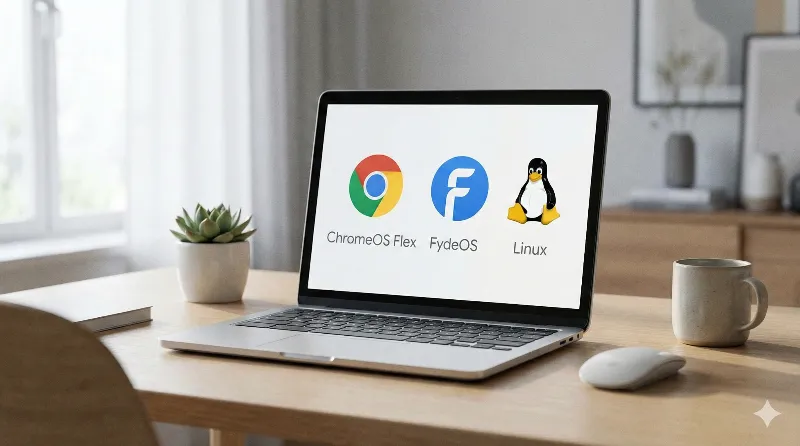ChromeOS Flex vs FydeOS vs Linux for Chromebook (2025 Full Comparison)

If you feel limited by the default ChromeOS on your Chromebook, you’re not alone. Many users want more control, better app support, offline functionality, and developer-friendly tools. That’s why three popular ChromeOS alternatives have been trending in 2025:
ChromeOS Flex
FydeOS
Linux (Ubuntu / Mint / Manjaro)
Each one offers more flexibility than stock ChromeOS — but they are very different in features, speed, privacy, and hardware support.
In this guide, you’ll get a comparative, honest, and easy-to-understand breakdown of all three, so you can choose the best OS for your Chromebook.
Quick Comparison Table
| Feature | ChromeOS Flex | FydeOS | Linux (Ubuntu/Mint/Manjaro) |
|---|---|---|---|
| Android Apps | ❌ No | ✅ Yes | ❌ No (unless emulated) |
| Linux Apps | ⚠️ Limited | ✅ Yes | ✅ Full native support |
| Speed | Fast | Fast | Depends on distro |
| Privacy | Medium | High | Very High |
| UI Style | ChromeOS | ChromeOS-like | Full Linux desktop |
| Best For | Old laptops & beginners | Android + Linux users | Developers & power users |
| Difficulty | Easy | Easy–Medium | Medium–Hard |
1. ChromeOS Flex — Best for Simplicity & Old Devices
ChromeOS Flex is Google’s official lightweight operating system designed to revive old PCs, Macs, and aging Chromebooks. It gives you the clean ChromeOS experience without requiring Chrome hardware.
Why Choose ChromeOS Flex
Super lightweight and fast
Boots quickly even on old devices
Very secure (automatic updates)
Looks exactly like ChromeOS
Perfect for simple browsing and cloud use
Major Limitations
No Android apps
Some Linux apps don’t work
Offline features are limited
Not ideal for developers or power users
Best For
Students
Office work
Browsing & watching videos
Very old Chromebooks with weak hardware
If all you need is a clean, fast OS with basic features, ChromeOS Flex does the job perfectly.
2. FydeOS — ChromeOS Experience With Android + Linux Support
FydeOS is a powerful alternative based on ChromiumOS (the open-source version of ChromeOS). It feels almost identical to ChromeOS, but with two huge advantages:
Built-in Android app support
Built-in Linux subsystem
This makes FydeOS much more flexible than ChromeOS Flex.
Why Choose FydeOS
Android apps via App Store
Linux apps and terminals for developers
UI almost same as ChromeOS
Very fast, lightweight, and stable
Better privacy than Google ChromeOS
Limitations
Not officially from Google
Some Google services may not be perfect
Slightly more complex installation than ChromeOS Flex
Best For
Users who want Android + Linux in one OS
People who love ChromeOS but want extra features
Students, casual users, and developers
Chromebook users who want more than ChromeOS Flex offers
If you want the best balance between simplicity and power, FydeOS is the winner.
3. Linux (Ubuntu, Mint, Manjaro) — Best for Developers & Power Users
If your goal is to turn your Chromebook into a full desktop computer, then Linux is unmatched. You can install popular distros like:
Ubuntu
Linux Mint
Manjaro
Debian
Fedora
Linux gives you full control, customization options, and access to thousands of native apps that ChromeOS can’t run.
Why Choose Linux
Full desktop-level power
Supports native apps like VS Code, GIMP, OBS, Steam (on supported hardware)
Amazing for programming and development
Very private and secure
Unlimited customization
Best performance on mid-range Chromebooks
Limitations
No native Android apps
Requires some technical knowledge
Installation can be harder
Battery life may vary depending on drivers
Best For
Programmers & coding students
People who want full offline functionality
Tech enthusiasts
Users who want to replace ChromeOS completely
If you want maximum power and freedom, Linux is the top choice.
4. ChromeOS Flex vs FydeOS vs Linux — Detailed Comparison
A. Speed & Performance
ChromeOS Flex: Fastest on old hardware
FydeOS: Slightly heavier but still extremely fast
Linux: Depends on distro — Mint XFCE and Manjaro XFCE are very fast
✔️ Winner for old Chromebooks: ChromeOS Flex
✔️ Winner for modern Chromebooks: Linux or FydeOS
B. App Support
ChromeOS Flex
No Android support
Limited Linux support
Best for PWAs and browser apps
FydeOS
Runs Android apps out of the box
Runs Linux apps properly
Best hybrid OS
Linux
Full native Linux apps
No built-in Android (can use Anbox or WayDroid)
Best for offline apps and development tools
✔️ Winner for Android apps: FydeOS
✔️ Winner for developers: Linux
✔️ Winner for everyday browsing: ChromeOS Flex
C. Privacy & Security
Linux: Extremely private (open-source, no tracking)
FydeOS: Very respectful privacy policy
ChromeOS Flex: Google ecosystem → data collection exists
✔️ Most private: Linux
D. Ease of Installation
ChromeOS Flex: Easiest
FydeOS: Medium
Linux: Medium to Hard depending on distro
✔️ Easiest setup: ChromeOS Flex
E. Best for Old Chromebooks
ChromeOS Flex
Linux Mint XFCE
FydeOS Lite (if available)
ChromeOS Flex wins simply because it’s made for weak hardware.
5. Which One Should YOU Choose?
Choose ChromeOS Flex if you want:
Fast performance
A simple interface
Basic browsing and study work
Something that "just works"
Choose FydeOS if you want:
Android apps
ChromeOS feel
Linux support
Better privacy than ChromeOS Flex
Choose Linux if you want:
A full desktop experience
Advanced tools and coding environments
Maximum customization
Strong privacy
Final
If your Chromebook feels limited or outdated, all three operating systems offer something better than stock ChromeOS — but for different needs:
Best for Beginners:
👉 ChromeOS Flex
Best All-Rounder (Android + Linux):
👉 FydeOS
Best for Developers / Power Users:
👉 Linux (Ubuntu/Mint/Manjaro)
Choosing the right OS depends on what you need the most — simplicity, apps, or full control.
Quick pick:
Try FydeOS if you want the best balance — ChromeOS feel + Android apps + Linux support.
Choose ChromeOS Flex if your Chromebook is old and you want the easiest, most reliable speed boost.
Go full Linux (Mint/Manjaro/Ubuntu) if you need development tools, native apps, or total control.
FAQs — ChromeOS Flex vs FydeOS vs Linux
1. Does ChromeOS Flex support Android apps?
No, ChromeOS Flex does not support Android apps.
2. Is FydeOS free to use?
Yes, FydeOS is mostly free and very similar to ChromeOS.
3. Can I install Linux on any Chromebook?
Yes, most Chromebooks support Linux either via developer mode or full installation.
4. Which Linux distro is best for Chromebooks?
Linux Mint XFCE and Manjaro XFCE work best for old or mid-range Chromebooks.
5. Which OS is best for gaming on Chromebook?
Linux (with Steam support) is the best option if your hardware supports it.

